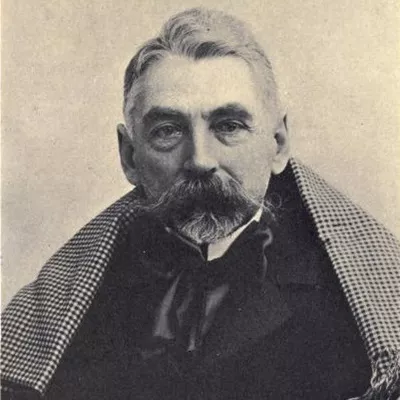
Stéphane Mallarmé (1842–1898) was a pioneering French poet and one of the foremost figures of the Symbolist movement. Celebrated for his complex, evocative language and philosophical depth, Mallarmé redefined the boundaries of poetry. His work inspired modernist literature and art, leaving an indelible mark on writers and movements seeking to elevate the art form to a transcendental plane.
Stéphane Mallarmé Biography
Stéphane Mallarmé, born Étienne Mallarmé, came into the world on March 18, 1842, in Paris, France. He grew up in a bourgeois family, with his early life marked by the death of his mother when he was five. Educated at prestigious schools, Mallarmé was initially a lackluster student, finding solace in literature, particularly the works of Edgar Allan Poe and Charles Baudelaire.
In 1862, Mallarmé obtained a teaching position, a profession he held for much of his life. Though he taught English, his passion lay in crafting poetry, which became his refuge from the monotony of teaching. Around this time, he married Maria Gerhard, a German music teacher, with whom he had two children.
The late 1860s marked the beginning of Mallarmé’s emergence as a significant poetic voice. His early works, such as Hérodiade and L’Après-midi d’un faune, showcased his affinity for symbolism and his ambition to push poetry beyond mere storytelling. He sought to distill abstract emotions and ideas into musical, almost sacred expressions, embracing an aesthetic of suggestion over direct statement.
Mallarmé’s personal philosophy centered around “pure poetry”—a quest for an absolute, transcendent language that captured the ineffable. His works, though celebrated, were often criticized for their density and obscurity. He famously described his own writing as aiming to invoke ideas indirectly, compelling readers to actively engage in interpretation.
His Paris salon became a hub for intellectuals, artists, and poets of his time, including Paul Valéry and Marcel Proust. These gatherings, known as “Mardis,” were instrumental in cultivating the Symbolist movement and fostering avant-garde ideas.
In his later years, Mallarmé focused on experimental works, notably the groundbreaking Un Coup de Dés Jamais N’Abolira Le Hasard (A Throw of the Dice Will Never Abolish Chance), which broke conventional structures of poetry. He passed away on September 9, 1898, in Valvins, France, but his influence continues to resonate across literature and art.
Stéphane Mallarmé Poems
1. L’Après-midi d’un faune (1876)
This celebrated poem depicts a faun’s dreamlike musings in a lush, mythical setting. Renowned for its musicality, it inspired Claude Debussy’s symphonic piece of the same name.
2. Hérodiade
A dramatic monologue centered on the biblical figure Salome, Hérodiade explores themes of purity, desire, and self-possession with rich imagery and allusion.
3. Un Coup de Dés Jamais N’Abolira Le Hasard (1897)
One of Mallarmé’s most experimental works, this visual poem dismantles traditional syntax and form, resembling a constellation of fragmented thoughts.
4. Brise Marine
A lyrical piece that conveys longing for escape, the sea becomes a metaphor for spiritual transcendence.
5. Les Fenêtres
This poem encapsulates Mallarmé’s fascination with the divide between mundane reality and transcendent imagination.
Selected Poems List L’Azur Prose pour des Esseintes Sainte La Chevelure Toast Funèbre Each of these works exemplifies Mallarmé’s intricate language, rich symbolism, and philosophical undertones. His oeuvre, though compact, is dense with innovation and artistic daring.
Stéphane Mallarmé Quotes
1.”A roll of the dice will never abolish chance.”
2.”To name an object is to suppress three-quarters of the enjoyment of the poem.”
3.”Poetry is the language of a state of crisis.”
4.”Everything in the world exists to end up in a book.”
5.”Dreams have as much influence as actions.”
6.”The poet is the priest of the invisible.”
7.”Form and content should blend into a harmony beyond the rational.”
8.”Music and poetry are one in their pursuit of the infinite.”
9.”The essence of a work of art is suggestion.”
10.”To understand beauty is to be lost in it.”
Stéphane Mallarmé Facts
1.He was deeply influenced by Edgar Allan Poe, even translating Poe’s works into French.
2.Mallarmé was one of the earliest poets to experiment with free verse.
3.His salon gatherings were instrumental in fostering Symbolism in France.
4.L’Après-midi d’un faune is considered a precursor to modernist poetry.
5.He was a perfectionist, often revising his works obsessively.
6.Mallarmé envisioned an “ideal book” that could contain the totality of human experience.
7.His experimental poem Un Coup de Dés influenced visual poetry and avant-garde typography.
8.He worked as a teacher, often clashing with bureaucratic demands.
9.Mallarmé’s ideas inspired Surrealist artists like Salvador Dalí.
10.He received little popular acclaim during his lifetime but was celebrated posthumously as a pioneer of modern literature.
